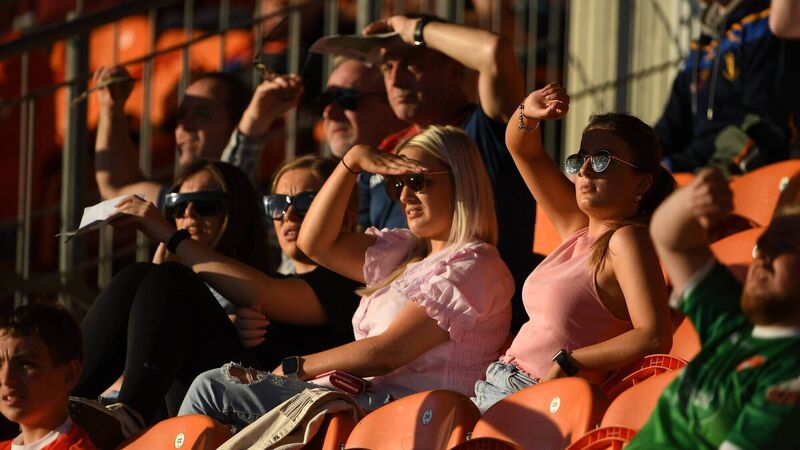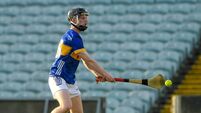If you’re a sports fan, you’re in an ongoing state of eagerness for the next game

Supporters look on during last month's Allianz FL Division 1 North Round 3 match between Armagh and Donegal at the Athletic Grounds. The matchday experience is something GAA supporters have badly missed during the pandemic. Picture: Piaras Ó Mídheach/Sportsfile
The Build-Up begins when the match first appears over the horizon. In reality, if you’re a sports fan, you’re in an ongoing state of eagerness for the next game. It’s an endless loop. Many years ago my now long-suffering wife asked me: Is there a match this weekend? I tried to break it gently:
The Build-Up is the anticipation stage of the story and Christopher Booker in his 2004 book relates this to the moment when ‘the hero is called to the adventure’. The great thing about going to games is that we all become the hero. We have been called to sport as children and now we are fulfilling that call.
In the GAA season, the Build-Up might become real when you decide you’re definitely going to the game. Apocryphal snippets appear on the wire. There’s a bit of chatter on WhatsApp. The odd phone call is made, ostensibly ‘just to catch up’ or check if ‘there’s any news’.
Everything ramps up on the week of the match. Everybody has to commit – in or out? Tickets have to be procured. Times have to be arranged – with the usual arguments. The team selection has to be criticised.
The story has begun.
The Journey to the game heightens the anticipation stage. Lately, Maureen Gaffney has been discussing how spending time and money on pleasurable experiences rather than objects boosts our wellbeing, and how badly Covid-19 has impacted on that.
Well, heading off in a car, bus or train to an anticipated match on a bright early-summer’s morning with family or friends is about as pleasurable as it gets for a GAA person. The countryside is washed in optimism, the greens of the chestnut tree are bright and new, the white of the hawthorn is never whiter.
But we still have to get there.
In stories, all those on a quest (Christopher Booker again) have to overcome terrible ordeals, but what could be more horrible and vicious than long tailbacks out of Ballyvourney or Newtownbutler or Headford or Holycross, with drinking time loudly ticking away? Hobbits or Indiana Jones or Luke Skywalker never had to face the recriminations of getting it wrong in a choice between Google Maps and two vociferous back seat drivers. Especially if it’s a family outing.
The quest is also a bonding experience and what better to bond over than food and drink? Food and celebration go together like short puck outs and disapproval and there’s so much to celebrate in being part of sport. Not to mention the huge amount of energy it takes to put on extravagant displays of emotion during a game.
If I and my merry band of fellow-travellers head off to Thurles, we’ll break our fasts somewhere in the town early in the day. And we’ll complete our return with a pint and dinner on the last leg home, in Cahir or Mitchelstown. Ebullient from or chastened by the game, the appetite is always good.
The great author and teacher Claire Keegan clarifies the difference between tension and drama. And tension is what we need most in story. What happens before and after the drama frames and contextualises it, and in stories context is everything.
On Approaching The Ground, when we see the great edifice appear before us, the tension is surging. But (and Claire would not approve) it’s a happy tension – a kind of oxymoron. We’re still (both sets of fans) all in this together. In a way the match will ruin such unity, but we want that, too.
Apart from when I’m with my family, I can’t think of anywhere else I feel such a powerful sense of identity as I do when I’m in the crowd walking up St. Joseph’s Road to Semple Stadium, or down Jones Road to Croke Park. It’s like faith in practice. Sport never seems as right as it does in those moments.
Just Before The Game We take our place and take in our surroundings. We take in the thousands of others around us and the field of play. We wait.
Here come the teams and the tension lodges deeper in the gut. It’s all so real.
All the colour, all the noise, all the emotion our senses can take are flowing out of us and through us.
Once The Match begins, everything changes.
Time changes and now we and the game are bound by time.
The drama unfurls itself. This is the heart of the matter and we are part of it, and we change too.
Half-Time brings respite and a type of reflection. Assimilation. The time that has bound both us and the game is now released, but we know the release is only temporary. Game time will return soon and then it will all be over.
At Half-Time, whether the game is going well or badly or is in the balance, there’s still hope.
Well, we convince ourselves there’s hope.
We discuss, we draw breath, we stretch our legs, we empty our bladders.
We wait again.
Who wins has often been decided before the game, but we don’t know that yet. Events very early in the game (goals, sendings off, injuries) can also be the so-called turning points, but, again, it’s the knowing that counts.
The Win/Lose Moment isn’t the deciding moment, it’s the moment when we whether we have won or lost, succeeded or failed. It may be the final whistle if the game is a cliff-hanger. And if we’re that lucky we feel happy or sad at the result, but we also feel complete.
Everybody fulfilled their role, the story was well told. The heroes were heroic, the villains were villainous. The resolution has been reached (yes, Booker again).
That’s all we want from story, and all we want from sport.
Now it’s over – but it isn’t, either.
After The Game we’re back in real-time. No longer bound by the referee’s whistle or the actions of the players. We’re free, but free to do what?
The play is over, our everyday lives encroach. Worries, stresses and failures are forming a disorderly queue.
Now we step back (literally) to take it all in. We retrace our steps down through the stadium. We retrace our steps to the car.
What happened? How did it happen? We need to figure things out and we need distance to achieve that.
This is a quieter time than before the game. We feel more alone for a while, even in the crowd.
After the voyage comes the return (last time with Booker, I promise).
On The Journey Home we relive and recount the moments of the game to each other. Often inaccurately and with bias, but that’s okay. Virginia Woolf says that nothing has really happened until it has been described. And we know something happened, so we describe it on the way home. Children are the best at Retelling, they never leave out a detail, especially the inconsequential ones.
But The Journey Home/Retelling is also the first part of the Build-Up to the next game.
The Build-Up begins when the match first appears over the horizon. In reality, if you’re a sports fan, you’re in an ongoing state of eagerness for the next game. It’s an endless loop…





